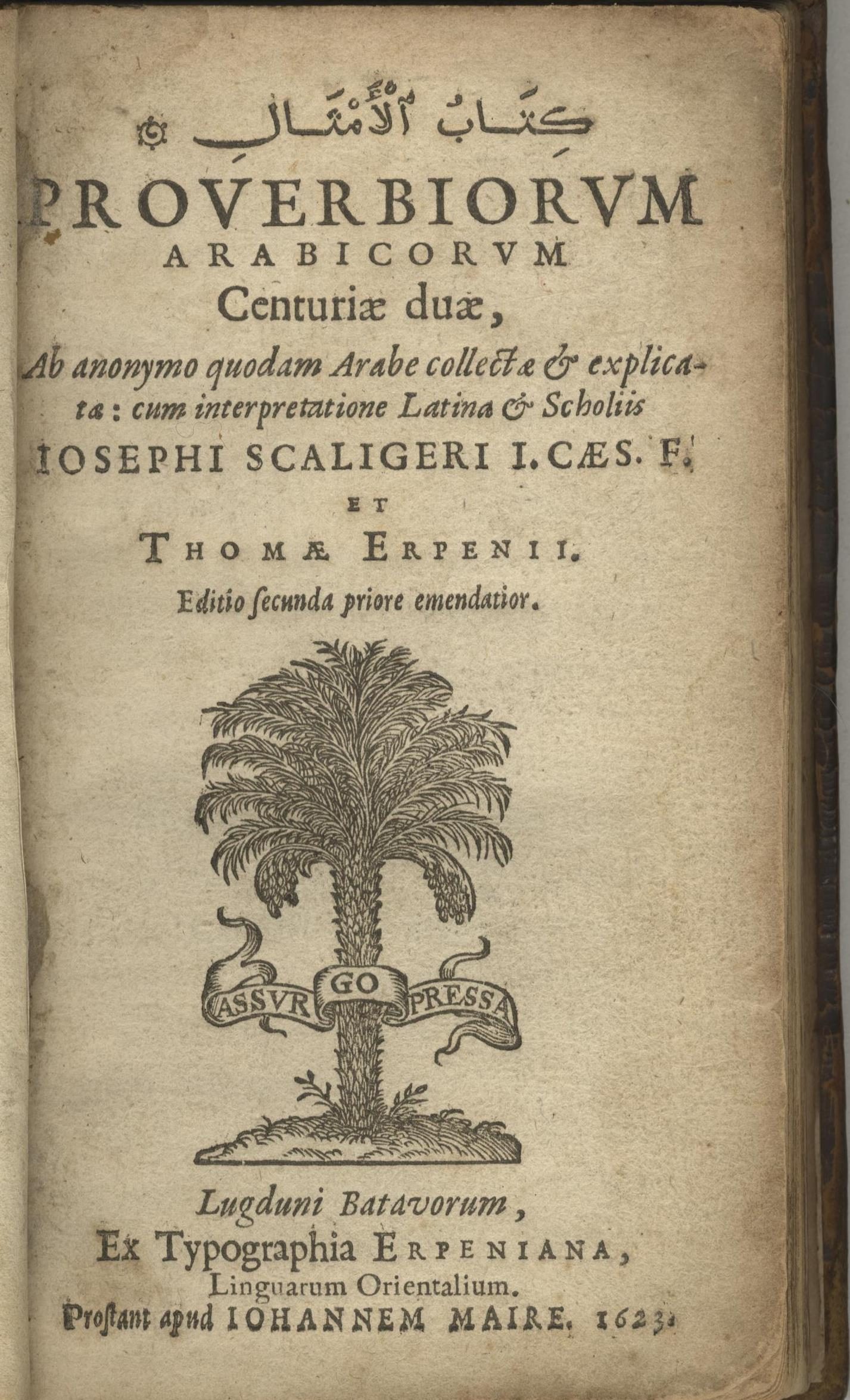Kitab al-Amthal. Proverbiorum Arabicorum centuriae duae, ab anonymo quodam Arabe collectae & explicata: cum interpretatione Latina & scholiis.
Ibn-Sallam, Abu Ubaid al-Qasim (773-837) / Joseph Juste Scaligeri & Thomas Erpenii.
Synopsis
Second edition of this collection of 200 Arabic proverbs, first published in 1614. The dedicatory epistle to Méric Casaubon, signed: ‘Thomae Erpenius’ is followed by a letter to Isaac Casaubon, dated ‘Calendis Martiis anni á nato Messia M.D.C.X1V.’ (date of the first, 4to edition), and ‘Praefatio Thomae Erpenii ad Lectorem’; two lettersto the author from Isaac Casaubon precede the main text; preliminary pages all in Latin; main text in Arabic and Latin; printer’s device of a palm tree and the motto: ‘Assurgo Pressa’ on recto of final leaf; the 1614 edition was printed ‘In Officina Raphelengiana’.
The celebrated Dutch orientalist, Thomas van Erpen, Professor of Oriental Languages in the University of Leyden, was not content merely to produce works for facilitating the study of Oriental languages; ‘il comprit que pour que leur connaissance ne se bornât pas uniquement à rendre plus aisée les relations politiques et commerciales, et pût devenir d’une utilité reélle pour la littérature, il fallait reproduire par la presse et répandre les oeuvres des écrivains de l’Orient. Aidé par des secours accordéspar les États-Généraux, il établit à Leyde, bientôt après son retour en Hollande, une imprimerie arabe, qu’il surveilla et qu’il dirigea lui-même.’ [NBG]
A selection from Abu ‘Ubayd ibn Sallam’s famous collection of Arabic proverbs, with Latin version by the great classical scholar Joseph Scaliger, prepared for publication by the pioneering Arabist Thomas Erpenius, and printed at the press of Frans Raphelengius the Elder. Abu ‘Ubayd ibn Sallam, an eighth-century scholar who studied at the grammatical schools of Basra, Kufa, and Baghdad, wrote standard works on a number of linguistic subjects, including his famous compilation of proverbs- his only known work on adab. As such, this book represents the first printing of any Arabic “literary” work. It is also one of the first Arabic publications from the Dutch university town of Leiden, famous for its Arabic studies and publications throughout the Golden Age of the seventeenth century and down to the present day. The Orientalist scholar-printer, Raphelengius (son-in-law of the great Antwerp printer, Plantin) had already in 1595 produced a specimen of Arabic types which included examples of maghribi letter forms; but it was not until the second decade of the seventeenth century that he produced any Arabic texts – Epistles from the New Testament, Erpenius’ great grammar of Arabic, his own Arabic-Latin Lexicon (the first such publication), and this edition of Arabic proverbs.
The original manuscript copy of the proverbs had been acquired in Rome by a Frenchman, David Rivault Sieur de Fleurance, who gave it at first to a Maronite for translating, and then took it back with him to Paris for the towering figure of French scholarship, Isaac Casaubon who, in turn, passed the manuscript to the other great scholar of the period, Joseph Scaliger in Leiden, who applied his rudimentary knowledge of Arabic to translating the proverbs. But it was Thomas Erpenius who prepared the edition and tactfully added notes to the great scholar’s work. The printed dedication is to Casaubon, by then a Huguenot exile in London and near the end of his life. A second edition, dedicated by Erpenius to Isaac Casaubon’s son, appeared in 1623.
Bibliographic references: Smitskamp, PO, 67; Fück, 61-62; Schnürrer, 217; Breugelmans, 200.








